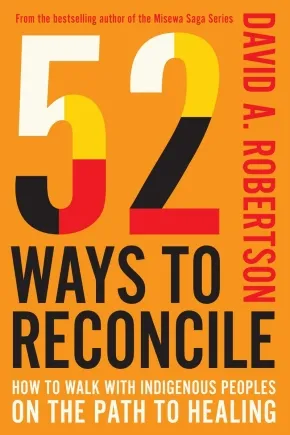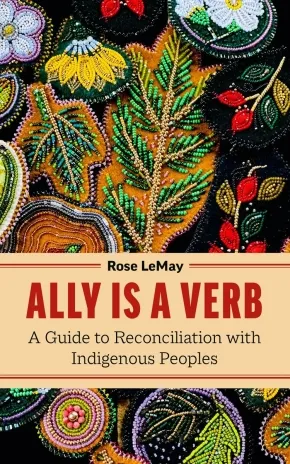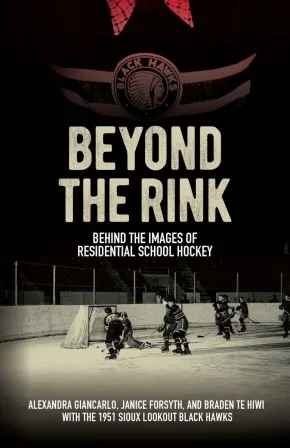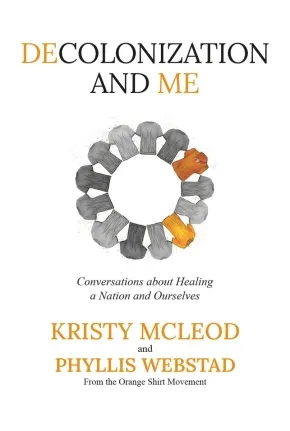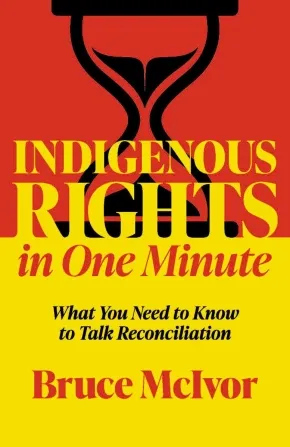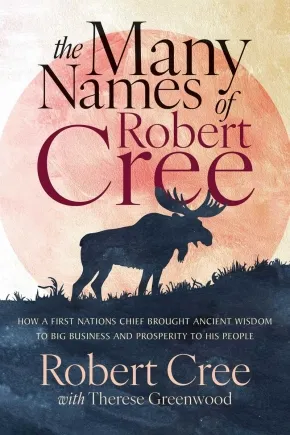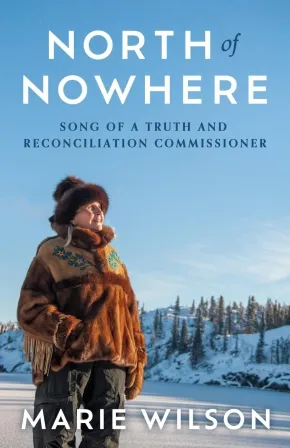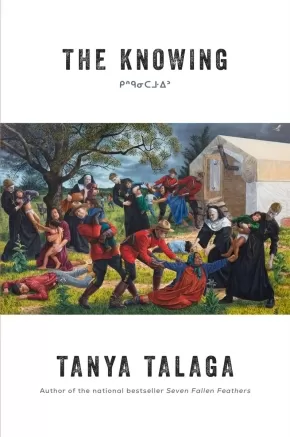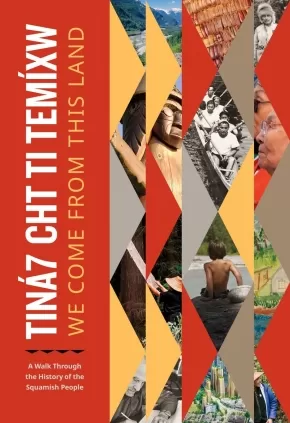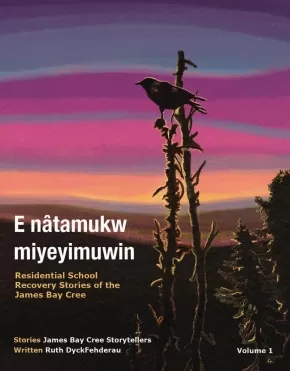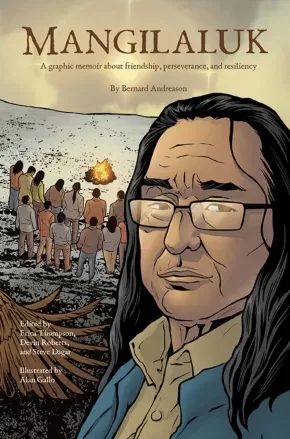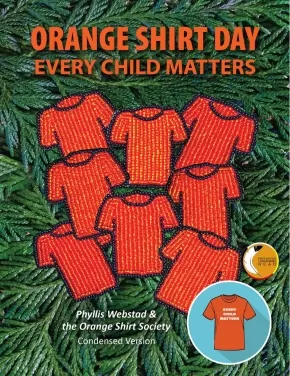
Legacy and Reconciliation
1
-
15
of
47 Results;
Sort By
Go To
of 4
52 Ways to Reconcile: How to Walk with Indigenous Peoples on the Path to Healing
$25.00
Format:
Hardcover
Text Content Territories:
Indigenous Canadian;
Reading Level: N/A
ISBN / Barcode: 9780771019357
Synopsis:
Synopsis:
From bestselling author of the Misewa Saga series David A. Robertson, this is the essential guide for all Canadians to understand how small and attainable acts towards reconciliation can make an enormous difference in our collective efforts to build a reconciled country.
52 Ways to Reconcile is an accessible, friendly guide for non-Indigenous people eager to learn, or Indigenous people eager to do more in our collective effort towards reconciliation, as people, and as a country. As much as non-Indigenous people want to walk the path of reconciliation, they often aren’t quite sure what to do, and they’re afraid of making mistakes. This book is the answer and the long overdue guide.
The idea of this book is simple: 52 small acts of reconciliation to consider, one per week, for an entire year. They’re all doable, and they’re all meaningful. All 52 steps take readers in the right direction, towards a healthier relationship between Indigenous and non-Indigenous people and a time when we are past trauma. By following these steps, we can live in stronger and healthier communities equally, and respectfully, together.
Additional Information
224 pages | 5.00" x 8.00" | Hardcover
Ally Is a Verb: A Guide to Reconciliation with Indigenous Peoples
$24.95
Format:
Paperback
Text Content Territories:
Indigenous Canadian;
Reading Level: N/A
ISBN / Barcode: 9781774585771
Synopsis:
Synopsis:
Your next step on the journey of reconciliation starts here.
What can you do to be a better ally for your Indigenous colleagues, community members, and friends? By actively listening to the history and current lived experiences of Indigenous peoples, you can take steps to address the inequities they continue to face. Author Rose LeMay notes that if you continually educate yourself, you will see many opportunities to be an ally.
This insightful book suggests how to enter the field of reconciliation in a good way, in your community and your workplace. You will learn:
-more about the true history shared by Indigenous peoples and colonial governments
-why reconciliation is mostly the responsibility of non-Indigenous people
-approaches to intervene when you see racism happening
-better ways to respond to emotions that come up when doing the work of an ally
-how to be an active team player for equity and inclusion
LeMay describes key principles to promote reconciliation, deepen your practice of allyship, and contribute to meaningful change.
Additional Information
200 pages | 5.00" x 8.00" | Paperback
Beyond the Rink: Behind the Images of Residential School Hockey
$24.95
Format:
Paperback
Text Content Territories:
Indigenous Canadian;
Reading Level: N/A
ISBN / Barcode: 9781772841060
Synopsis:
Synopsis:
Teammates, champions, Survivors
In 1951, after winning the Thunder Bay district championship, the Sioux Lookout Black Hawks hockey team from Pelican Lake Indian Residential School embarked on a whirlwind promotional tour through Ottawa and Toronto. They were accompanied by a professional photographer from the National Film Board who documented the experience. The tour was intended to demonstrate the success of the residential school system and introduce the Black Hawks to "civilizing" activities and the "benefits" of assimilating into Canadian society. For some of the boys, it was the beginning of a lifelong love of hockey; for others, it was an escape from the brutal living conditions and abuse at the residential school.
In Beyond the Rink, Alexandra Giancarlo, Janice Forsyth, and Braden Te Hiwi collaborate with three surviving team members-Kelly Bull, Chris Cromarty, and David Wesley-to share the complex legacy behind the 1951 tour photos. This book reveals the complicated role of sports in residential school histories, commemorating the team's stellar hockey record and athletic prowess while exposing important truths about "Canada's Game" and how it shaped ideas about the nation. By considering their past, these Survivors imagine a better way forward not just for themselves, their families, and their communities, but for Canada as a whole.
Reviews
"These three survivors-Kelly, David, and Chris-inspire us not only for what they have done for their communities in the aftermath of the residential school system but also for how crucial hockey and sports are in bringing Indigenous communities together, like we see in the Little NHL Tournament. Our history and the lessons we've learned are vital, and Beyond the Rink does an excellent job of highlighting this." — Ted Nolan, former NHL Player & Coach, Olympic Coach, and author of Life in Two Worlds: A Coach's Journey from the Reserve to the NHL and Back
"On its face, Beyond the Rink is a compelling story of a residential school hockey team from northern Ontario touring Ottawa and Toronto in the 1950s. But it is much more than that: with a National Film Board photographer accompanying them every step of the way, the players are props in a public relations exercise meant to obscure the true conditions in residential schools.
This is an unflinching and nuanced look behind the PR veil, a story of loss, triumph, perseverance, tragedy, and memory. It is also a detailed account of the machinery of residential schools and the trauma they inflicted. And it is a revealing look at the power of photographs, which can be used to both illuminate and mislead.
At its heart, Beyond the Rink is the story of twelve Indigenous hockey players, who, like their white counterparts, loved the game for the thrill of competition, but also as an escape from the relentless control and exploitation they faced on a daily basis, even if they were being exploited while doing it. This is the story of twelve boys, told through the lens of three of them, trapped in a world they barely understood, a world that was not the least bit interested in understanding them, and in many ways still isn't." — Gord Miller
"The authors have spent decades working with the Survivors whose stories they share and centre in this book. Beyond the Rink, Behind the Image does not simply tell the story of a hockey team; it demonstrates how sport within the context of residential schools was a tool of colonization." — Karen Froman
"It is difficult to overstate the significance of this book. The scholarship is sound as well as original in context and content, and Survivor testimony is respected and communicated in a theoretically sophisticated way." — Travis Hay
Additional Information
184 pages | 6.00" x 8.50" | 36 b&w illustrations, bibliography | Paperback
Decolonization and Me: Conversations about Healing a Nation and Ourselves
$30.99
Text Content Territories:
Indigenous Canadian; First Nations; Salish; Interior Salish; Secwepemc (Shuswap); Stswecem'c Xgat'tem; Métis;
Reading Level: N/A
ISBN / Barcode: 9781778540684
Synopsis:
Synopsis:
This book invites readers to step into a space of reflection on your personal relationship with truth, reconciliation, and Orange Shirt Day.
Written in response to the increase of residential school denialism, Phyllis Webstad and Kristy McLeod have collaborated to create a book that encourages readers to face their own biases. This book challenges readers through a series of sensitive conversations that explore decolonization, Indigenization, healing, and every person’s individual responsibility to truth and reconciliation. Centered around the Orange Shirt Day movement, and a National Day for Truth and Reconciliation, these conversations encourage readers to unpack and reckon with denialism, biases, privilege, and the journey forward, on both a personal and national level.
Within each chapter, Phyllis Webstad draws on her decade of experience (sharing her Orange Shirt Story on a global level and advocating for the rights of Indigenous Peoples) to offer insights on these topics and stories from her personal journey, which co-author and Métis scholar, Kristy McLeod, helps readers to further navigate. Each section includes real denialist comments taken from social media and Kristy's analysis and response to them. Through empathy-driven truth-telling, this book offers an opportunity to witness, reflect, heal, and be intentional about the seeds we hope to plant for the future, together.
Additional Information
350 pages | 5.70" x 8.25" | Hardcover
Gino: The Fighting Spirit of Gino Odjick
$36.00
Format:
Hardcover
Text Content Territories:
Indigenous Canadian; First Nations; Anishinaabeg; Algonquin; Kitigan Zibi Anishinabeg;
Reading Level: N/A
ISBN / Barcode: 9781778402708
Synopsis:
Synopsis:
From veteran hockey reporter Patrick Johnston and Gino’s longtime friend Peter Leech comes the authorized biography of Gino Odjick.
In the 1980s and ’90s, National Hockey League games were very different from the nimble, skill-focused displays we see today. One of the greatest differences—and one of the sport’s more popular facets at the time—was the widespread presence of “enforcers”: hulking, battle-scarred players whose main task was to police the sport by chasing down and brawling with opponents who had broken unwritten codes determining which aspects of violence counted as dishonorable or unjustified.
When hard-hitting Vancouver Canucks player Gino Odjick emerged in the early 1990s, he quickly became one of the game’s most feared enforcers and revered teammates, a sign of a new era for the team, racking up 296 penalty minutes in the 45 games he played in his rookie season. Hailing from Kitigan Zibi, an Algonquin community near Maniwaki, Quebec, Gino was one of the few Indigenous players in the NHL at the time. But it was Gino’s ferocious play contrasted by his genuinely affable and openhearted personality off the ice that won him a special place in the hearts of Canucks supporters.
Yet legends often obscure the human stories behind them. Patrick Johnston and Peter Leech look beyond Gino’s legendary persona, drawing on insights from family members, friends, and teammates to recount Gino’s early years in a loving household that was always ready to welcome foster children. Gino’s father, Joe, had suffered the lonely traumas of the residential school system, and the experience had instilled a commitment in the family to those who were less fortunate.
The book also details Gino’s eventual struggles with alcohol abuse, and how he responded by taking on the role of empathetic mentor to young Indigenous people, travelling from community to community to hear their stories and offer hope. He never wavered in this role, even as he confronted serious illnesses, including chronic traumatic encephalopathy (CTE) and the rare blood disorder that he survived for years longer than expected, but that eventually led to his death at age fifty-two.
Gino is a moving tribute to a beloved hockey legend.
Reviews
"Gino was the greatest teammate; he had such a huge heart and knew his role better than anyone in the league. Gino loved being a Vancouver Canuck and gave back to the community in so many ways. He will be greatly missed by his family, friends, and fans. This book will give people insight into his remarkable life."—Geoff Courtnall
“Gino provides a compelling account of the life of a beloved Vancouver Canuck. From his humble beginnings in Quebec to NHL stardom and beyond, Odjick was dedicated to the well-being of teammates and the Indigenous community. This is an excellent tribute to an exceptional man.”—Randi Druzin, author of Between the Pipes and Behind the Mask
Additional Information
288 pages | 6.00" x 9.00" | b&w insert | Hardcover
Indigenous Rights in One Minute: What You Need to Know to Talk Reconciliation
$22.95
Format:
Paperback
Text Content Territories:
Indigenous Canadian;
Reading Level: N/A
ISBN / Barcode: 9780889714885
Synopsis:
Synopsis:
Internationally renowned as an expert in Aboriginal law and an advocate for Indigenous rights, Bruce McIvor delivers concise, essential information for Canadians committed to truth and reconciliation.
A shortage of trustworthy information continues to frustrate Canadians with best intentions to fulfill Canada’s commitment to reconciliation with Indigenous Peoples. To meet this demand, lawyer and historian Bruce McIvor provides concise, plain answers to 100 essential questions being asked by Canadians across the country.
During his nearly three decades advocating for Indigenous rights and teaching Aboriginal law, McIvor has recorded the fundamental questions that Canadians from all corners of society have asked to advance reconciliation: Why do Indigenous people have special rights? What is the Doctrine of Discovery? Who are the Métis? Why was the Calder decision important? What is reconciliation? McIvor supplies the answers Canadians are looking for by scrapping the technical language that confuses the issues, and speaks directly to everyone looking for straight answers. Throughout, McIvor shares his perspective on why reconciliation as envisioned by the courts and Canadian governments frustrates Indigenous people and what needs to change to overcome the impasse. McIvor’s explanations of complex legal issues demonstrate a unique mix of a deep knowledge of the law, the ability to write clearly and concisely, practical experience from the frontlines of advocating for First Nations in courtrooms and at negotiation tables across the country, and a profound passion for justice rooted in his work and personal history.
To ensure the country’s reconciliation project progresses from rhetoric to reality, ordinary Canadians need straightforward answers to fundamental questions. McIvor provides the answers and context to support a thoughtful and respectful national conversation about reconciliation and the fulfillment of Canada’s commitment to a better future for Indigenous people.
Additional Information
208 pages | 5.50" x 8.50" | 25 colour and b&w photographs | Paperback
The Many Names of Robert Cree: How a First Nations Chief Brought Ancient Wisdom to Big Business and Prosperity to His People
$26.95
Format:
Paperback
Reading Level: N/A
ISBN / Barcode: 9781770418301
Synopsis:
Synopsis:
A vital account of the life and many names of Robert Cree, and his plan for a peaceful, sincere, and just path to reconciliation in an angry and chaotic world.
His mother called him “Bobby Mountain.” Elders called him “Great Man.” His people called him “Chief.” Oil men called him “Mr. Cree.” But the government called him “Number 53.” Robert Cree was all of these while facing his people’s oppressors and freeing the ghosts of tortured spirits.
The Many Names of Robert Cree is his first-person account of survival in a brutally racist residential school system designed to erase traditional Indigenous culture, language, and knowledge. It is also the story of an epic life of struggle and healing, as Cree takes the wisdom of his ancestors and a message of reconciliation to the halls of government and to industry boardrooms.
In the storytelling tradition of his people, Cree recounts his early years in the bush, his captivity at a residential school, his struggles with addiction, his political awakening as one of Canada’s youngest First Nation Chiefs, and the rising Indigenous activism of the late 20th and early 21st centuries. He also recounts the oil industry’s arrival on his poverty-stricken reserve and the ensuing struggle to balance economic opportunity with environmental challenges.
Throughout, Cree’s leadership is rooted in his unshakable commitment to the sacred traditional teachings of his people. His beliefs give him the strength to focus on hope, dignity, and building a better future for his community. Now a respected Elder and spiritual leader, Cree champions forgiveness as a powerful force that can bring healing and transformation for all.
Additional Information
264 pages | 6" x 9" | Paperback
North of Nowhere: Song of a Truth and Reconciliation Commissioner
$34.99
Format:
Hardcover
Text Content Territories:
Indigenous Canadian; First Nations; Inuit; Métis;
ISBN / Barcode: 9781487011482
Synopsis:
Synopsis:
The incomparable first-hand account of the historic Truth and Reconciliation Commission of Canada told by one of the commissioners who led it.
The Truth and Reconciliation Commission was established to record the previously hidden history of more than a century of forced residential schooling for Indigenous children. Marie Wilson helped lead that work as one of just three commissioners. With the skills of a journalist, the heart of a mother and grandmother, and the insights of a life as the spouse of a residential school survivor, Commissioner Wilson guides readers through her years witnessing survivor testimony across the country, providing her unique perspective on the personal toll and enduring public value of the commission. In this unparalleled account, she honours the voices of survivors who have called Canada to attention, determined to heal, reclaim, and thrive.
Part vital public documentary, part probing memoir, North of Nowhere breathes fresh air into the possibilities of reconciliation amid the persistent legacy of residential schools. It is a call to everyone to view the important and continuing work of reconciliation not as an obligation but as a gift.
Reviews
"I found Marie Wilson's North of Nowhere profoundly moving and surprisingly optimistic. With humility and wisdom, she takes us behind the scenes of the Truth and Reconciliation Commission. As a non-Indigenous woman long settled in the North, she has a unique viewpoint, and she leavens an account of the traumatic intergenerational impact of residential schools with details from her own personal story. Wilson goes beyond the grief and misery triggered by the Truth aspect of the TRC to suggest the joy and laughter that true Reconciliation can produce in survivors. But reconciliation will be achieved only if we don't look away. North of Nowhere is a powerful book that shifted my perspective, and, thanks to Wilson's lucid prose, helps the rest of us glimpse what is needed." — Charlotte Gray (CM), author of Passionate Mothers, Powerful Sons: The Lives of Jennie Jerome Churchill and Sara Delano Roosevelt
"For anyone wanting a front row seat to the Spirit, the vision, and the mechanics of the Truth and Reconciliation Commission of Canada, North of Nowhere is definitely it. Commissioner Dr. Marie Wilson recounts and celebrates the courage of everyone involved in one of Canada's most important chapters of coming to terms with residential school Survivors and their families and their communities forever changed with a policy of cultural genocide. I hope everyone reads this and finds their way to support Survivors, their families, and their communities as they continue to reclaim so much of what was stolen. What a profound and riveting read." — Richard Van Camp, author of The Lesser Blessed and Godless but Loyal to Heaven
"The long-matured work of a true elder, this magnificent book is a sober masterpiece of sacred activism. It deserves to be read by everyone aghast at the chaos and cruelty of our world. Its level decency of tone, its lucidity, its determined hope in terrible circumstances both transmit and model those qualities we all now need to build a new world out of the smouldering ashes of the old." — Andrew Harvey, author of The Hope: A Guide to Sacred Activism
"In North of Nowhere, Marie Wilson honours her vow to residential school Survivors to 'do no harm' and to bear witness to and honour their experiences. Marie has achieved her purpose to educate readers and inspire reconciliation and, most importantly, hope. 'I see you. I hear you. I believe you. And I love you'-Marie's words as a Commissioner to Survivors set the tone for this very important book." — Perry Bellegarde, former National Chief of the Assembly of First Nations
"This book is one of the best I've ever read. It made me laugh, get emotional, and helped reset my journey on the role I need to play. As a child of residential school Survivors, I was motivated to continue to learn my language and strengthen my pride as an Indigenous person. Truth must come before reconciliation; this book will empower Canadians to focus on what we can control today when it comes to implementing the Calls to Action. This book advocates for building awareness, understanding, and long-term relationships between Indigenous people and Canadians. If every Canadian reads this book, the Truth and Reconciliation Calls to Action can be achieved." — Cadmus Delorme, former chief of Cowessess First Nation
"Journalist Marie Wilson brings us into the emotion-charged rooms, the sacred spaces of Canada's Truth and Reconciliation hearings. She listens with the heart of a mother, looking into the souls of the adult Survivors standing before her and seeing the children they once were. Though she holds nothing back, in the end this is a triumphant, restorative narrative-a testament to the healing that happens when we share our deepest, darkest truths." — Judy Rodgers, founding director of Images & Voice of Hope, board member of The Peace Studio
"North of Nowhere is the story of a national soul-searching, braided with Dr. Marie Wilson's own personal story and her unique perspective as a Truth and Reconciliation Commissioner. Every page tells a story. This is a book that is bound to ignite dialogue. It has been a catalyst that has been the spark for numerous visits, deep discussions, and reflections, which is why we wanted to write a collective review. Marie's writing had us thinking and talking about the stories, truths, and wisdom shared throughout the pages. Through her writing, Marie elicits emotional and insightful responses that move us along our own journeys of understanding the truth of Canada." — Shelagh Rogers and Monique Gray Smith
"Marie Wilson is the truth keeper entrusted with the accounts of the First Nations, Métis, and Inuit children who went to residential schools, the memories of those who did not make it home and the fate of us all if we do not learn from the past. The savagery of 'civilization' comes into stark relief as children emerge from the pages to awaken the national consciousness and render the TRC Calls to Action imperative." — Cindy Blackstock, executive director, First Nations Child & Family Caring Society
"Beautifully written, Marie Wilson's North of Nowhere is a stunning work of truth, power, and wisdom. An imperative read for all Canadians to understand the layers of shrapnel left by the residential school system that will leave you with emotion and hope. Wilson is an incredibly brilliant and gifted writer." — Angela Sterritt, author of Unbroken: My Fight for Survival, Hope, and Justice for Indigenous Women and Girls
Educator Information
Curriculum Connections: Social Science, Ethnic Studies, Canadian Studies, Indigenous STudies
Additional Information
384 pages | 6.00" x 9.00" | Hardcover
Righting Canada's Wrongs Indigenous Studies Resource Guide (6 in Stock)
$24.95
Format:
Paperback
Text Content Territories:
Indigenous Canadian; First Nations; Inuit; Métis;
ISBN / Barcode: 9781459419643
Synopsis:
Synopsis:
A resource guide for the Righting Canada’s Wrongs Indigenous Studies set that provides lessons in historical thinking.
The Righting Canada's Wrongs Indigenous Studies set series is devoted to the exploration of racist and discriminatory government policies and actions against Indigenous peoples through our history, the fight for acknowledgement and justice and the eventual apologies and restitution of subsequent governments. The books in this series make a valuable addition to any classroom or library looking for kid-friendly and appealing resources on Indigenous Studies and equal rights in Canada. The engaging and curriculum-based lessons in this Resource Guide will help students to further understand some of the important events in Canada's history that helped shape our current multicultural society. Educators will find support for teaching about Canada's past and ongoing treatment of Indigenous Peoples and how to approach the topic of, colonization, racism and discrimination. As well, students will learn about the important cultures and traditions that have continued in the face of colonization.
Educator Information
Recommended for use with ages 13+
This resource guide provides lessons in historical thinking for the Righting Canada’s Wrongs Indigenous Studies set:
- Righting Canada's Wrongs: Inuit Relocations: Colonial Policies and Practices, Inuit Resilience and Resistance
- Righting Canada's Wrongs: Residential Schools: The Devastating Impact on Canada's Indigenous Peoples and the Truth and Reconciliation Commission's Findings and Calls for Action (PB) - 2nd Edition
- Righting Canada's Wrongs: The Sixties Scoop and the Stolen Lives of Indigenous Children
Additional Information
120 Pages | 8.5" x 11" | Paperback
The Knowing
$39.99
Format:
Hardcover
Text Content Territories:
Indigenous Canadian; First Nations; Anishinaabeg; Ojibway; Inuit; Métis;
Reading Level: N/A
ISBN / Barcode: 9781443467506
Synopsis:
Synopsis:
From Tanya Talaga, the critically acclaimed and award-winning author of Seven Fallen Feathers, comes a riveting exploration of her family’s story and a retelling of the history of the country we now call Canada
For generations, Indigenous People have known that their family members disappeared, many of them after being sent to residential schools, “Indian hospitals” and asylums through a coordinated system designed to destroy who the First Nations, Métis and Inuit people are. This is one of Canada’s greatest open secrets, an unhealed wound that until recently lay hidden by shame and abandonment.
The Knowing is the unfolding of Canadian history unlike anything we have ever read before. Award-winning and bestselling Anishinaabe author Tanya Talaga retells the history of this country as only she can—through an Indigenous lens, beginning with the life of her great-great grandmother Annie Carpenter and her family as they experienced decades of government- and Church-sanctioned enfranchisement and genocide.
Deeply personal and meticulously researched, The Knowing is a seminal unravelling of the centuries-long oppression of Indigenous People that continues to reverberate in these communities today.
Additional Information
480 pages | 6.12" x 9.25" | Hardcover
Tiná7 Cht Ti Temíxw: We Come from This Land
$35.00
Format:
Paperback
Text Content Territories:
Indigenous Canadian; First Nations; Salish; Coast Salish; Squamish;
Grade Levels: 12; University/College;
ISBN / Barcode: 9781774583920
Synopsis:
Synopsis:
A story of the Sḵwx̱wú7mesh Úxwumixw (Squamish Nation): past, present, and future.
One hundred years after Sḵwx̱wú7mesh (Squamish) leadership signed an amalgamation agreement that declared several communities in Squamish territory as one nation, this accessible history of the Sḵwx̱wú7mesh people traces our stories from ancient times to the present. Tiná7 Cht Ti Temíxw: We Come from This Land offers the culmination of generations of knowledge about the Squamish People and Sḵwx̱wú7meshulh Temíx̱w (Squamish People’s Territory).
Today, we are over 4,100 people and growing, living within Sḵwx̱wú7meshulh Temíx̱w and beyond. Our 6,732-square-kilometre territory includes the watersheds of the Squamish River, Mamquam River, and Howe Sound in the north, and English Bay, False Creek, and Burrard Inlet in the south. It encompasses saltwater and rushing rivers, old-growth forests at valley bottoms, and alpine forests high above the ocean.
Oral histories and archaeological sites demonstrate our relationship with the lands and waters going back over twelve thousand years. Here, we introduce ancient Squamish stories and ways, as well as describe relationships with our neighbours from time immemorial. We discuss early contact with Europeans and the disastrous effects of racism and colonialism, the Indian Act, reserves, and residential schools. We detail our engagement with the imperfect tool of the Canadian judicial system in several significant court cases that have advanced Indigenous rights. And we show how the Squamish Nation is taking back ownership and stewardship within our homelands.
Tiná7 Cht Ti Temíxw: We Come from This Land is a powerful introduction to our vast history and a launching point for discovering more about the different places, people, and stories offered here.
Additional Information
416 pages | 6.50" x 9.50" | Paperback
E nâtamukw miyeyimuwin: Residential School Recovery Stories of the James Bay Cree, Volume 1
$29.99
Format:
Paperback
Text Content Territories:
Indigenous Canadian; First Nations; Cree (Nehiyawak); James Bay Cree;
Reading Level: N/A
ISBN / Barcode: 9781989796238
Synopsis:
Synopsis:
In this quietly powerful and deeply human book, Ruth DyckFehderau and twenty-one James Bay Cree storytellers put a face to Canada’s Indian Residential School cultural genocide.
Through intimate personal stories of trauma, loss, recovery, and joy, they tell of experiences in the residential schools themselves, in the homes when the children were taken, and on the territory after survivors returned and worked to recover from their experiences and to live with dignity. The prose is clear and accessible, the stories remarkably individual, the detail vivid but not sensational.
Together they reveal the astonishing courage and strength of children along with the complexity and myriad methods of their oppressors. A tough, often funny, and ultimately uplifting book that’s not quite like anything else out there.
This book is published by Cree Board of Health and Social Services of James Bay and distributed by WLU Press.
Reviews
“These previously unwritten stories of lived, traumatized experiences are testament to the storytellers’ courage and strength and resilience. When the rich Cree traditional and spiritual relationship with land and with family is harmed by separation, hatred, and fear - a harm resulting in anger and loss of values, identity, and self-worth - these storytellers find ways to heal. Through their stories, you learn about culture as treatment, about the power of forgiveness and love, and about peaceful co-existence in community as essential to healing, belief, and advancing true reconciliation.” —Chief Willie Littlechild, Ermineskin Cree Nation, Former Truth and Reconciliation Commissioner, Former residential school student athlete, Order of Canada; Order of Sport, Member of Sports Halls of Fame, Canada and North America
“These Cree stories, told with utmost respect and a feeling of safety, are gifts. They are medicine.” —Joanna Campiou, Woodland/Plains Cree Knowledge Keeper
“This is a difficult but necessary book. There’s a power to truth and to the realities of the Indian Residential School system, but for those wanting to see strength and movement toward hope, this is the book for you. These stories hold that hope close to the heart. What shines through is a love of the land, a love of community, a love of the Cree language, a love of family – exactly what colonial forces like the IRS system tried to destroy but couldn’t.” —Conor Kerr, Metis/Ukrainian author, Avenue of Champions, Giller Prize longlist
Additional Information
320 pages | 7.00" x 9.00" | Paperback
Haywaas' Question: What Is Reconciliation?
$16.95
Format:
Paperback
Text Content Territories:
Indigenous Canadian; First Nations; Haida;
ISBN / Barcode: 9781738736706
Synopsis:
Synopsis:
After Haywaas sees his parents get frustrated while watching the news, this precocious 12-year-old begins a months-long journey navigating many different answers to what he thought was a simple question.
Expertly crafted by a teacher-parent-author duo, Haywaas’ Question is relatable, understandable, and aptly builds up to an answer we’re all a part of.
Educator Information
The publisher recommends this picture book for Grades 4 - 10.
This book is available in French: La Question de Haywaas: Qu'est-ce que la réconciliation?
Additional Information
36 pages | 7.00" x 9.00" | Paperback
Mangilaluk: A Graphic Memoir about Friendship, Perseverance, and Resiliency
$18.95
Artists:
Format:
Paperback
Text Content Territories:
Indigenous Canadian; Inuit;
ISBN / Barcode: 9781774507384
Synopsis:
Synopsis:
“Some children are born into the world and are home as soon as they come Earthside. Others spend their lifetimes searching for a home, a place to belong, a place where they are safe. I am one of those children.”
After running away from residential school, Bernard Andreason and his two best friends begin a harrowing 130-kilometre journey from Inuvik to Tuktoyaktuk, one which only Bernard would survive. In this heartbreaking and beautifully told graphic memoir, Bernard recounts his time in residential school and the tragic journey that took the lives of his two best friends. We then follow Bernard as he returns home, haunted by his past and struggling to find his place. Despite enduring more challenges into adulthood, Bernard never stops pursuing healing and higher learning, and he finds a support network that helps him. His story shows us that the possibility of finding a safe and loving home exists, and it is something every child deserves.
Mangilaluk is an extraordinarily affecting new addition to Qinuisaarniq ("resiliency"), a collection of books created to educate readers about the history and impacts of residential schools.
Educator Information
Recommended for ages 14 to 18.
Mangilaluk exposes readers to the experience and perspective of an Inuk residential school survivor. It also shares a powerful story of friendship, personal growth and self-forgiveness, and the value of finding a supportive community.
This book is part of the Qinuisaarniq program. Qinuisaarniq (“resiliency”) is a program created to educate Nunavummiut and all Canadians about the history and impacts of residential schools, policies of assimilation, and other colonial acts that have affected the Canadian Arctic.
Each resource has been carefully written and reviewed to include level-appropriate opportunities for students to learn about colonial acts and policies that have affected Inuit. These acts and policies created long-lasting impacts on Inuit individuals and communities, which are still being felt today.
Additional Information
100 pages | 7.25" x 11.00" | Paperback
Orange Shirt Day: Every Child Matters: Condensed Edition
$19.99
Format:
Paperback
Text Content Territories:
Indigenous Canadian; First Nations; Inuit; Métis;
ISBN / Barcode: 9781778540158
Synopsis:
Synopsis:
A special abridged version of the award-winning book Orange Shirt Day: September 30th.
Orange Shirt Day, observed annually on September 30th, is also known as the National Day for Truth and Reconciliation. It is an official day to honour Residential School Survivors and their families, and to remember the children who did not come home. What was initially envisioned as a way to keep the conversations going about all aspects of Residential Schools in Williams Lake and the Cariboo Region of British Columbia, Canada, has now expanded into a movement across Turtle Island and beyond.
Orange Shirt Day: Every Child Matters aims to create champions who will walk a path of reconciliation and promote the message that 'Every Child Matters'. This version also explores a number of important topics including the historical, generational, and continual impacts of Residential Schools on Indigenous Peoples, the journey of the Orange Shirt Day movement, and how you can effectively participate in the National Day for Truth and Reconciliation. With end-of-chapter reflection questions and a series of student art submissions, readers are guided to explore how they, and others, view and participate in Residential School reconciliation.
Educator Information
Recommended for Young Adults (ages 10+)
This is an abridged version (condensed version) of Orange Shirt Day: September 30th.
This book is available in French: La journee du chandail orange: Chaque enfant compte
Additional Information
108 pages | 8.50" x 11.00" | Paperback
Sort By
Go To
of 4

